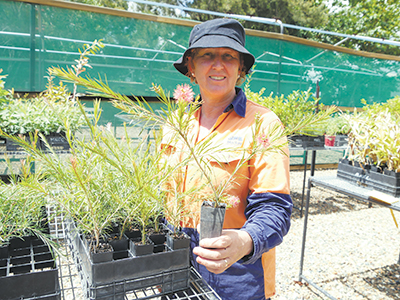Since the Mackay Natural Environment Centre’s (MNEC) extensive redevelopment nearly 12 months ago, more than 40,500 plants have been planted from its stocks around the region. A further 50,000 plants are currently being grown, including 27,000 trees.
These plants are all local natives. In fact, they are all from within 100km of Mackay and are known as “local provenience” species.
Once they are large enough to plant, these trees, shrubs and grasses will be used in revegetation projects across the region.
Plants are being utilised currently for a variety of projects, including 20,000 for Little McCreadys Creek, 5000 for Lagoons Creek, 3000 for Janes Creek Junior Soccer Grounds, 10,000 for council water sensitive urban design projects, and 17,000 for various coastal and riparian sites, in conjunction with Reef Catchments.
Nursery supervisor Sue McCormack said that with the establishment of the MNEC, plants for council revegetation projects can be grown in large quantities on site.
“Not only are we saving on the cost of buying in plants, but we have actually created a revenue stream due to the high demand for our plants for local projects.
“The demand is high because the plants are sourced locally, have a high tolerance to our conditions and climate, and therefore not only survive, but thrive.
“The nursery is also operated under a set of stringent sanitary conditions and we are currently being audited in order to attain certified Nursery and Garden Industry accreditation.”
The MNEC-grown plants are in demand by organisations like North Queensland Bulk Ports, Reef Catchments and National Parks as well as various local contractors.
Last year, MNEC also donated thousands of plants to community organisations like the Royal Society for the Prevention of Cruelty to Animals (RSPCA), Coastcare volunteers, Land for Wildlife property owners, and many others, as well as local schools and kindergartens.
Ms McCormack said staff and volunteers from the Mackay Regional Council Natural Environment reserves harvest the seeds for the plants.
“We regularly go out on seed collecting missions and those seeds are then processed at the MNEC.
“We recently received and germinated a supply of rare and valuable Mackay Cedar seeds.
“The Mackay Cedar only seeds about once every eight to nine years and the seed can’t be stored for long, so we are very excited to have a good supply of plants currently in several stages of growth.”
The MNEC is also remarkable because of its energy efficiency. “Rainwater collected at the centre is stored in a series of large water tanks and used to water the seedlings.
“What is really special about the facility though is that the water is recycled.
“Once the plants are watered, the run-off water is gathered by an underground collection system, and then pumped up to a special automated shed to be filtered, disinfected and then returned to the tanks.
“The irrigation system is web based so will shut off when it rains, and we can get reports of any leaks on our phones, thus saving water.”
The facility is designed to be as self-sufficient as possible, so MNEC generates and returns solar power to the grid, all pots are cleaned and reused, and green waste is composted.
Dedicated groups of volunteers help to keep the centre running and are also responsible for the MNEC’s vegetable garden, which flourishes on the Centre’s compost.
Stage two of the Natural Environment Centre is currently under development. It will increase capacity for additional plants and include a new water bed area for growing plants essential for the revegetation of wetlands areas.

















